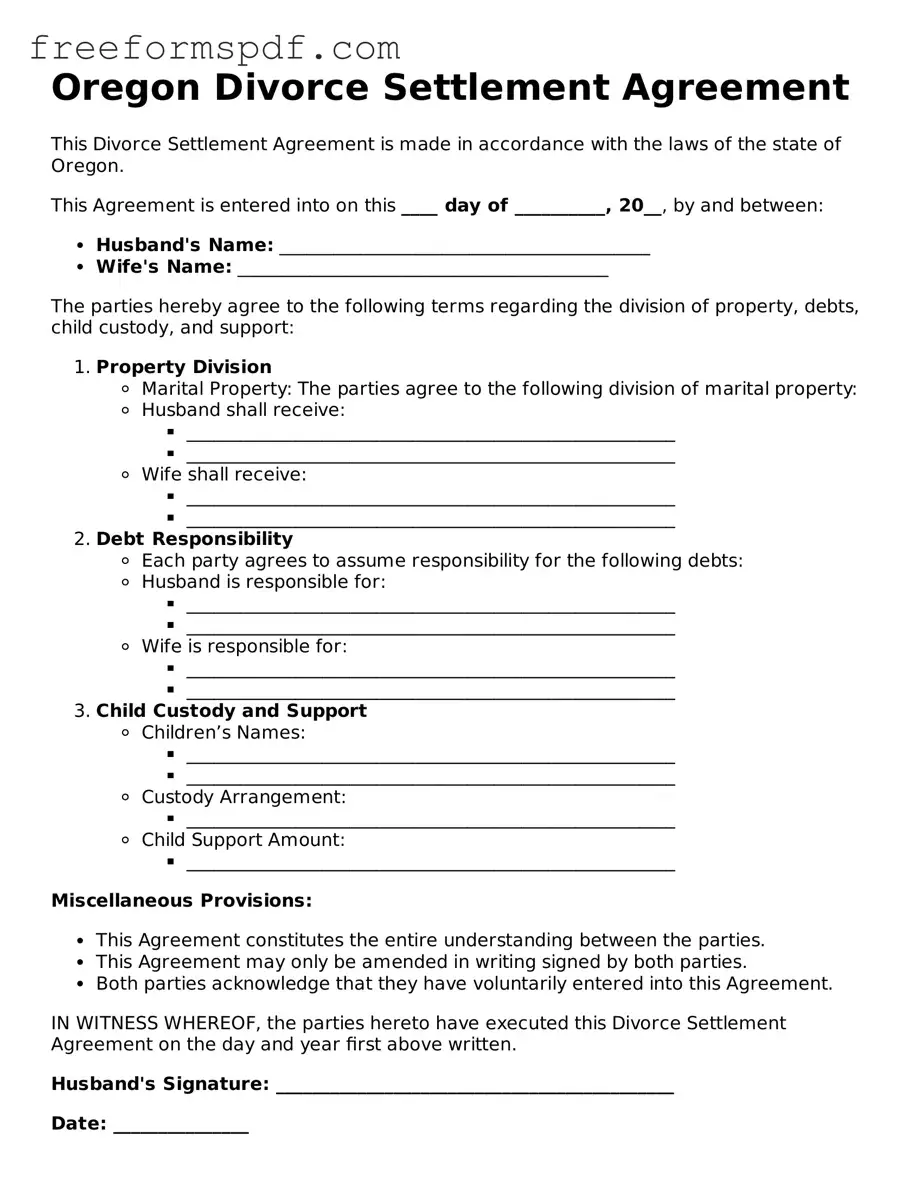Attorney-Verified Divorce Settlement Agreement Document for Oregon State
Common mistakes
-
Incomplete Information: Many individuals fail to provide all necessary details. This includes missing names, addresses, or other vital information that could delay the process.
-
Incorrect Financial Disclosures: Some people underestimate or overestimate their income and assets. Accurate financial information is crucial for a fair settlement.
-
Ignoring Tax Implications: Failing to consider the tax consequences of property division can lead to unexpected liabilities. It’s essential to understand how these decisions affect your tax situation.
-
Not Addressing Future Changes: Life circumstances can change. Not including provisions for future modifications, such as changes in income or living arrangements, may create problems later.
-
Overlooking Legal Requirements: Each state has specific requirements for divorce agreements. Ignoring these can result in the agreement being invalid or unenforceable.
Learn More on This Form
-
What is a Divorce Settlement Agreement in Oregon?
A Divorce Settlement Agreement is a legal document that outlines the terms agreed upon by both parties during a divorce. This agreement typically covers various aspects such as the division of property, child custody arrangements, child support, and spousal support. It serves to formalize the decisions made by both spouses and is submitted to the court for approval.
-
How do I create a Divorce Settlement Agreement?
To create a Divorce Settlement Agreement, both parties need to discuss and negotiate the terms of their divorce. It’s often beneficial to consult with a legal professional who can provide guidance on what should be included in the agreement. Once both parties reach a consensus, the agreement should be drafted in writing. Ensure that it is clear, comprehensive, and addresses all relevant issues to avoid future disputes.
-
Do I need a lawyer to file a Divorce Settlement Agreement?
While it is not mandatory to hire a lawyer to file a Divorce Settlement Agreement, it is highly recommended. An attorney can help ensure that the agreement complies with Oregon law, protects your rights, and addresses all necessary aspects of your divorce. If both parties agree on all terms, they may choose to file the agreement without legal representation, but having legal advice can prevent complications later on.
-
What happens after the Divorce Settlement Agreement is filed?
Once the Divorce Settlement Agreement is filed with the court, a judge will review it to ensure that it is fair and complies with the law. If the judge approves the agreement, it will become part of the final divorce decree. This means that the terms outlined in the agreement are legally binding, and both parties must adhere to them. If either party fails to comply, the other party may seek enforcement through the court.
-
Can a Divorce Settlement Agreement be modified?
Yes, a Divorce Settlement Agreement can be modified, but it typically requires the consent of both parties. If circumstances change significantly—such as a job loss, relocation, or changes in the needs of children—either party may petition the court for a modification. The court will review the request and determine whether the changes are warranted. It is advisable to document any modifications in writing to maintain clarity and legality.
Misconceptions
When dealing with the Oregon Divorce Settlement Agreement form, several misconceptions can lead to confusion. Understanding these misconceptions is crucial for anyone navigating the divorce process in Oregon.
- Misconception 1: The form is only necessary for uncontested divorces.
- Misconception 2: Once signed, the agreement cannot be changed.
- Misconception 3: The form guarantees a quick divorce.
- Misconception 4: Legal advice is unnecessary if both parties agree.
Many believe that the Divorce Settlement Agreement form is only required when both parties agree on all terms. In reality, even in contested cases, this form can help clarify issues and serve as a basis for negotiations.
Some individuals think that signing the agreement locks them into its terms forever. However, modifications can be made if both parties agree, and the court approves the changes.
People often assume that completing the form will expedite the divorce process. While it is a necessary step, other factors, such as court schedules and additional paperwork, can still delay the finalization.
Some couples think they do not need legal counsel because they are on good terms. However, having an attorney review the agreement can help ensure that both parties' rights are protected and that the terms are fair and enforceable.
Some Other Divorce Settlement Agreement State Templates
Divorce in Washington - It lays out the conditions for the exclusive use of marital property.
How Long Do You Have to Be Married to Get Half of Everything in Ny - It also covers legal implications of the agreement itself, ensuring both parties are informed.
For those preparing for future healthcare decisions, understanding the Arizona Medical Power of Attorney form is vital. This resource provides crucial insights into its completion and implications, ensuring your healthcare choices are respected while you focus on recovery. Consider reviewing our guide on the importance of a comprehensive Medical Power of Attorney for your planning needs at comprehensive Medical Power of Attorney.
What Is a Wife Entitled to in a Divorce in Texas - Legal advice can be invaluable in protecting one's interests within the agreement.
Virginia Divorce Law - The Divorce Settlement Agreement might cover debts and how they will be handled.
